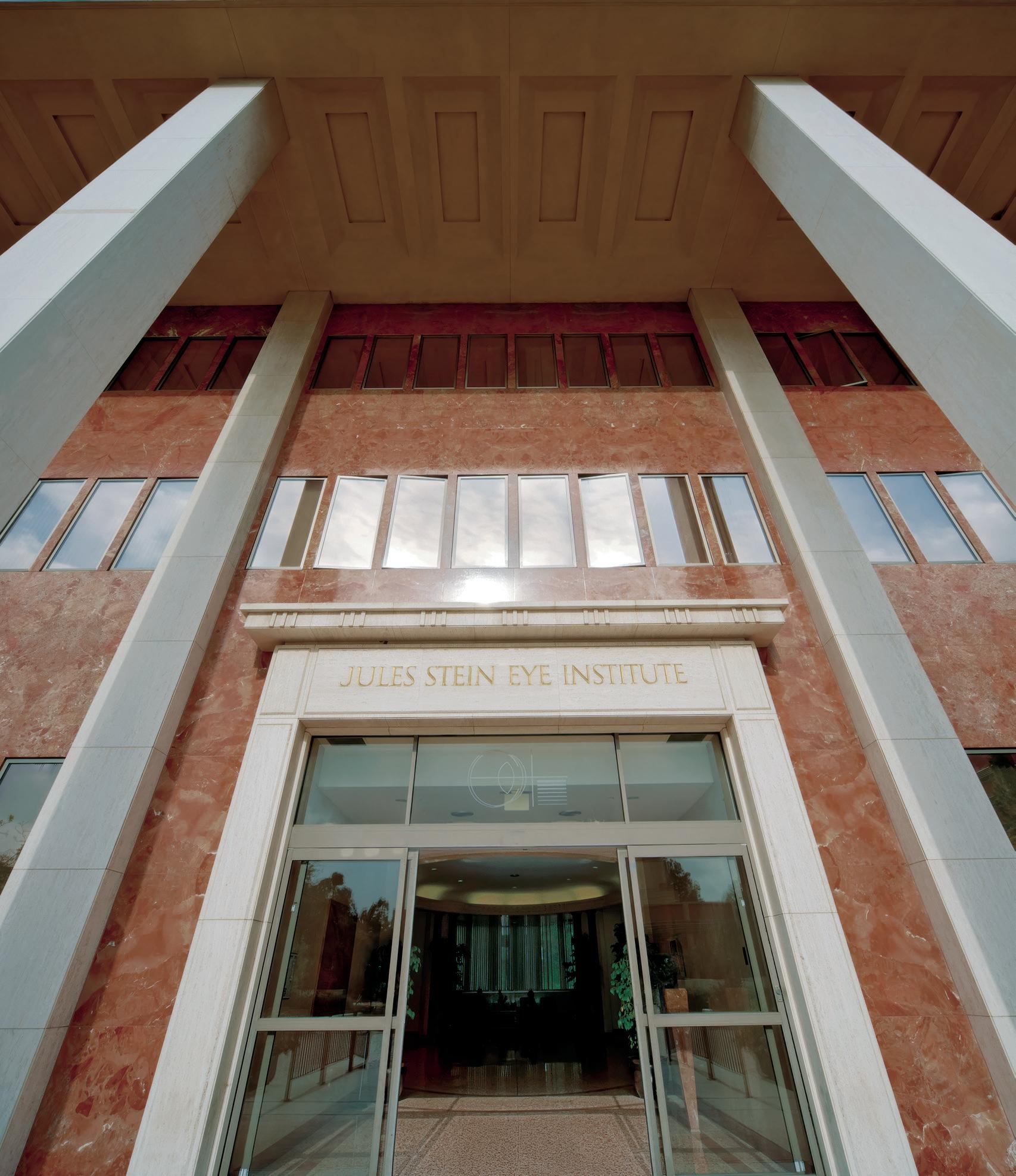
UCLA Department of Ophthalmology
Jules Stein Eye Institute and Doheny Eye Institute
UCLA Health
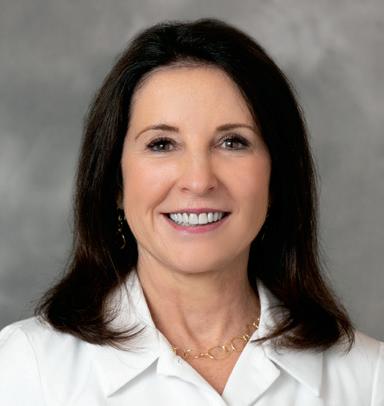


UCLA Department of Ophthalmology
Jules Stein Eye Institute and Doheny Eye Institute
UCLA Health

is a publication from the UCLA Department of Ophthalmology.
Jules Stein Eye Institute and Doheny Eye Institute are proud affiliates.
EDITOR-IN-CHIEF
Anne L. Coleman, MD, PhD
MANAGING EDITOR
Tina-Marie Gauthier
c/o UCLA Stein Eye Institute
100 Stein Plaza, UCLA Los Angeles, California 90095-7000 Tina@EyeCiteEditing.com
PUBLICATION COMMITTEE
Anthony Aldave, MD
Susan Lee DeRemer, CFRE
Deborah Ferrington, PhD
JoAnn Giaconi, MD
Marissa Goldberg
Kevin Miller, MD
Peter Quiros, MD
Roxana Radu, MD
Alfredo Sadun, MD, PhD
EDITORIAL SUPPORT
Stephanie Colucci
PHOTOGRAPHY
Reed Hutchinson
Rich Schmitt
Robin Weisz
DESIGN
Robin Weisz Design
© 2025 by The Regents of the University of California.
All rights reserved.
Dear Friends,
It is with great pride and gratitude that I share all we’ve accomplished together as a Department and community. A particularly meaningful highlight was the premiere of our documentary honoring the visionary leadership of Drs. Jules Stein and Bradley R. Straatsma . Their profound impact—on patients, trainees, and the field of ophthalmology—was beautifully captured and continues to guide our mission.
Our momentum is visible in many ways. We’ve welcomed award-winning faculty— clinicians and vision scientists with expertise in artificial intelligence, genomics, retinal diseases, strabismus, and neuro-ophthalmology. We opened the new Doheny Eye Center-UCLA in Pasadena, designed with both patients and providers in mind. Located on the Doheny Eye Institute campus, it delivers state-of-the-art care and is a testament to our investment in excellence. We also celebrate 10 years of the UCLA Stein Eye Surgery Center, a cornerstone of ophthalmic care at the Jules Stein Eye Institute.
This spring, we honored the retirement of Dr. Debora Farber with a symposium recognizing her remarkable contributions to vision science. Her work has left a permanent imprint on our Department and the field at large.
In addition to being a dynamic force at national and international meetings, our faculty and trainees made an exceptional showing at this year’s ARVO annual meeting, contributing 146 presentations—an impressive reflection of our commitment to research and innovation.
In July, we proudly marked the graduation of our residents and fellows—an inspiring group of future leaders in ophthalmology. As Senator Orrin Hatch said, “Graduation is not the end; it’s the beginning.” Their journey forward will carry the values and excellence of the UCLA Department of Ophthalmology into new frontiers.
As you read this issue, I hope you feel the same pride I do. These are not just individual achievements—they are shared milestones that reflect our Department’s advancement, purpose, and promise.
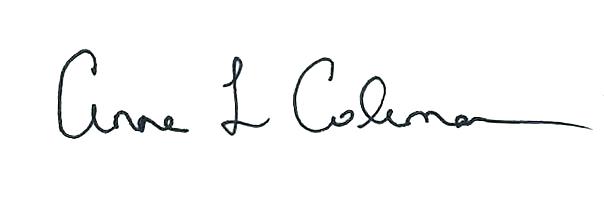
Bradley R. Straatsma, MD, Endowed Chair in Ophthalmology Chair, UCLA Department of Ophthalmology Director, Jules Stein Eye Institute Affiliation Chair, Doheny Eye Institute

A Dual Dedication to Ophthalmology and Philanthropy
Guided by personal experience and purpose, Dr. William Stivelman has dedicated his life to advancing ophthalmology and supporting seniors with dementia through The Mary Oakley Foundation, while maintaining a lasting bond with UCLA’s Jules Stein Eye Institute.
PAGE 18
A first-person documentary explores the founding of the Jules Stein Eye Institute through Dr. Bradley Straatsma’s eyes and his transformative partnership with Dr. Jules Stein.
PAGE 2
UCLA DEPARTMENT OF OPHTHALMOLOGY
JULES STEIN EYE INSTITUTE AND
DOHENY EYE INSTITUTE
To celebrate the lasting impact of two respected UCLA retinal specialists, Drs. Allan Kreiger and Jerome Pearlman, an endowed lectureship was established by Dr. Alan Norton to honor their compassion, mentorship, and groundbreaking work—and to inspire the global sharing of vision science for generations to come.
PAGE 19
FOCUS
Doheny Eye Center UCLA–Pasadena: 9 Welcome to Our New Home!
Situated on the Doheny Eye Institute campus in Pasadena, the newest Doheny Eye Center UCLA location elevates patient care, encourages collaboration, and ushers in a new chapter in the long-standing partnership between Doheny and UCLA’s Jules Stein Eye Institute.
UCLA Stein Eye Surgery Center: 10 Years of Excellence 9
Celebrating its 10th anniversary, the UCLA Stein Eye Surgery Center at the Jules Stein Eye Institute has set new standards in surgical excellence.
Celebrating a Trailblazer: Dr. Debora Farber 10
A symposium paid tribute to Dr. Debora Farber’s groundbreaking vision-science research. Her work investigating retinal degeneration and ocular albinism has significantly advanced our understanding of inherited eye diseases.
INSTITUTE NEWS 8–12 AUPO 2025
UCLA Ophthalmology Shines at ARVO 2025
Faculty Honors
NEW FACULTY APPOINTMENTS 13
Adrian Au, MD, PhD
Michael J. Gilhooley, MD, PhD
Emma M. Lessieur, MD, PhD
Joel Zylberberg, PhD
EDUCATION 14–16
Courses February 1–July 31, 2025
ALUMNI BULLETIN 17
Dr. Bronwyn Bateman Receives Gradle Medal
Dr. David Hwang Honored as Doheny Distinguished Alumnus
GRADUATION CEREMONY 20–21
Graduation 2025
Guests gathered at the Jules Stein Eye Institute’s vision-science campus on June 25, 2025, for a special screening of Jules Stein Eye Institute: A Celebration of Our Founders —an original interview documentary featuring Bradley R. Straatsma, MD, JD, founding chair of the UCLA Department of Ophthalmology and the Institute’s founding director. The film offers a rare and intimate glimpse into the early history of one of the world’s premier establishments for ophthalmology, tracing Dr. Straatsma’s remarkable journey in medicine, his enduring partnership with Dr. Jules Stein , and the visionary efforts that helped transform UCLA into a global leader in eye care, research, and education. With newly unearthed archival footage, the documentary brings to life the foundational moments that shaped the Institute, offering a personal and historical lens into its lasting impact.
Explaining the purpose behind the film, Anne L. Coleman, MD, PhD, chair of the Department of Ophthalmology, director of the Jules Stein Eye Institute, and affiliation chair of Doheny Eye Institute said, “The documentary was born out of a desire to preserve the rich oral history of the Institute, particularly the firsthand stories shared by Dr. Straatsma over the years. Recognizing the value of these personal accounts and the risk of them being lost over time, a team was brought together to document Dr. Straatsma’s memories and pair them with archived materials. The result is a meaningful tribute that captures the spirit and legacy of the Institute through the voice of one of its most influential figures.”
At the screening, Dr. Coleman also paid tribute to Lew Wasserman, president (1946–73) and chairman of the board (1973–96) of MCA and a dedicated philanthropist, steadfast in his commitment to carrying on Dr. Stein’s legacy and further growth of the Institute. She further acknowledged his grandson, Casey Wasserman, a leader at UCLA and in the city of Los Angeles, for his continued dedication to preserving and propelling that enduring legacy along with the Jules Stein Eye Institute Board of Trustees.

When Dr. Straatsma arrived at UCLA in the late 1950s, he immediately realized it was an institution of great possibilities. Having trained at Yale, Columbia, the Armed Forces Institute of Pathology, and at Johns Hopkins, Dr. Straatsma brought with him both rigorous academic standards and a keen eye for opportunity.
At that time, ophthalmology was a division within the Department of Surgery, without a dedicated academic faculty to support its growth. Under the guidance of Dr. Rodman Irvine, and with encouragement from UCLA’s leadership, Dr. Straatsma became the first full-time faculty member in ophthalmology. And with that role came the responsibility—and the rare chance—to build a program that could rival the country’s most established eye centers.
by purpose, they transformed a bold idea into a world-renowned Institute at UCLA.
“In helping to create this facility, we have begun to meet the critical needs that must be met if the sight of this nation is to be preserved.”
DR. JULES STEIN
Soon after his arrival, Dr. Straatsma learned of a donation made by Dr. Stein, a former ophthalmologist turned powerful entertainment executive and founder of MCA. Hoping for a meeting, Dr. Straatsma contacted Dr. Stein—who declined the invitation. Undeterred, Dr. Straatsma persisted, and a year later, Dr. Stein invited him to a planning conference for his new national philanthropic organization, Research to Prevent Blindness. That event marked the beginning of a relationship that would shape the future of ophthalmology at UCLA.
Dr. Stein initially envisioned modest support for a small facility at UCLA, but Dr. Straatsma saw greater potential. With the support of his wife, Ruth, Dr. Straatsma didn’t go on a planned vacation, instead opting to draft a comprehensive proposal for an eye institute that would integrate research, education, and patient care. Along with the written plan, he delivered a conceptual sketch of an institute on UCLA’s campus to Dr. Stein. The vision struck a chord.
As Dr. Stein would later humorously recount, “I was the victim of my own game,” convinced by a coalition of trusted advisors, including Dr. Straatsma and Dean Stafford Warren, to sponsor what would become the Jules Stein Eye Institute.
The success of the Jules Stein Eye Institute is deeply rooted in the leadership at UCLA. From its earliest days, the Institute benefited profoundly from the support of an exceptional University environment—not merely as an institution, but as a collective of forward-thinking individuals. Key among them were UCLA’s chancellors, including Vern Knudsen, Franklin Murphy, and Richard Young , whose administrative foresight helped shape a fertile ground for medical innovation.
Equally critical was the leadership within the UCLA School of Medicine. Founding Dean Stafford Warren, followed by Sherman Mellinkoff and subsequent deans, played a foundational role in integrating the Institute’s mission with UCLA’s broader medical education and research goals. Their guidance helped secure vital resources, attract top-tier faculty, and ensure that the Jules Stein Eye Institute would not only thrive within the University but also influence ophthalmology worldwide.

Under the visionary direction of Dr. Straatsma, the contributions of Drs. Leonard Apt , Dean Bok , Robert Christensen, Robert Foos, Michael Hall, S. Rodman Irvine, and Thomas Pettit were instrumental in shaping the Jules Stein Eye Institute into a driving force of excellence, innovation, and influence within academic medicine. Their impact on the field—and on the Institute’s legacy—cannot be overstated.

The formal dedication of the Jules Stein Eye Institute took place on the afternoon of November 3, 1966, as several thousand well-wishers gathered on the west terrace to witness the historic moment.
Concluding his remarks, Dr. Stein declared, “The history of the Institute begins with this dedication. I am confident it will be a proud history.” At that moment, Doris Stein stepped forward to cut the ribbon draped across the entrance—symbolically opening the Institute and ushering in a new era in vision science and care.
The formal dedication of the Jules Stein Eye Institute in 1966 was more than just a ribbon cutting. Spanning several days, the opening included academic seminars attended by global leaders in ophthalmology, donors, UCLA faculty, and the Hollywood community. One symbolic moment captured the Institute’s mission poignantly: at a gala banquet, guests were asked to don blindfolds. In darkness, unable to see one another, they experienced firsthand the importance of vision—the very sense the Institute was dedicated to preserving and restoring—without a word being necessary.
The personal bond between Dr. Stein and Dr. Straatsma soon blossomed into a powerful partnership. Dr. Stein and his wife, Doris, welcomed Dr. Straatsma and his family into their social circle, which included Hollywood’s most iconic figures of the day, including Walt Disney and Alfred Hitchcock.
These connections were more than ceremonial—they led to meaningful partnerships, including with entertainment industry leader Lew Wasserman and his wife, Edie, who became major benefactors of the Institute. Many of Dr. Stein’s Hollywood colleagues became supporters and, often, patients of the Institute. Events hosted at the Stein residence and the Institute raised funds and public awareness, bridging the gap between the medical and entertainment worlds in a way rarely seen before or since.
The Institute soon became a center for excellence in clinical care, research, and training. Dr. Straatsma took pride in the high standards of the residency and fellowship programs, and in the success of graduates who would carry the Institute’s intention across the country and around the world.
Throughout their years working together, Dr. Straatsma held deep admiration for Dr. Stein’s intellect, business acumen, and unwavering commitment to excellence. “I can’t afford to do something unless I do it very well,” Dr. Stein once told him—an ethos that guided every aspect of their collaboration. Dr. Straatsma’s respect was matched by Dr. Stein’s trust, leading to a relationship built on mutual purpose and shared ambition.
Importantly, Dr. Straatsma learned to ensure Dr. Stein remained informed—not just of the Institute’s needs, but of its accomplishments. When rankings placed UCLA outside the top spot in ophthalmology, Dr. Stein expressed concern. Dr. Straatsma responded not with defensiveness, but with transparency—highlighting achievements, not just requests. From that point on, Dr. Stein and his wife were invited to attend every annual seminar, deepening their involvement and cementing their legacy.
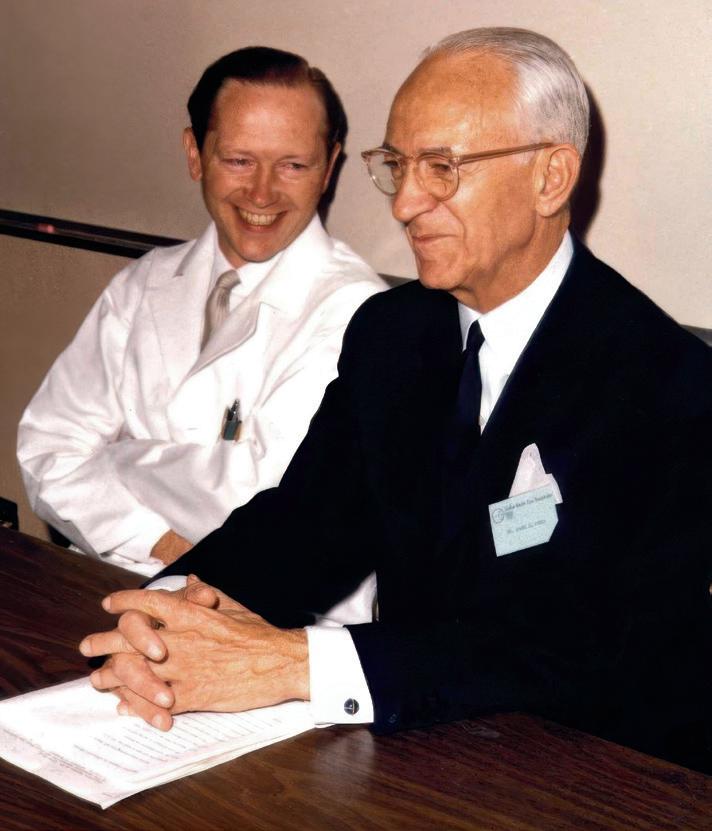

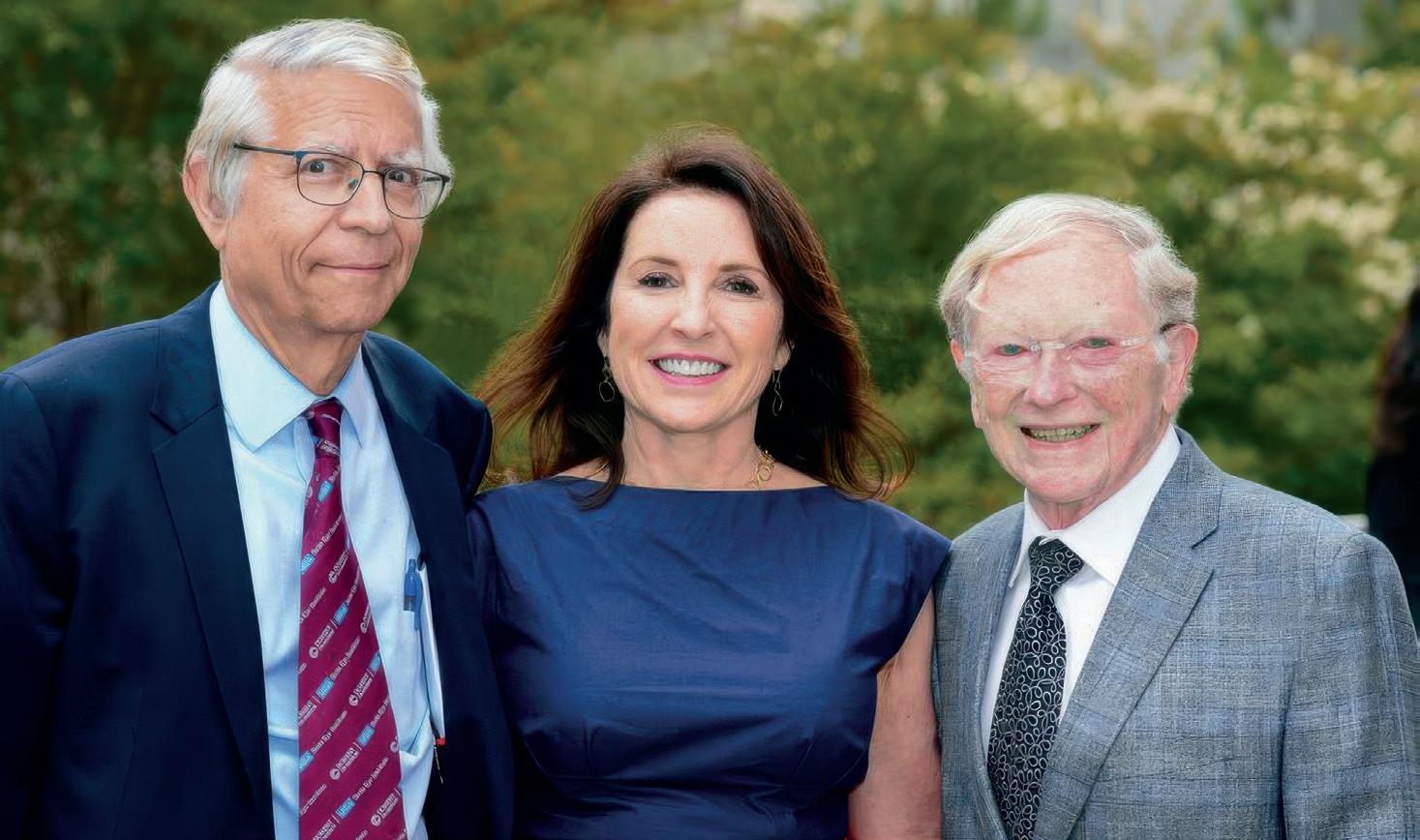
Dr. Straatsma’s commitment to ophthalmology didn’t stop at UCLA’s doorstep. Community engagement was equally crucial. The UCLA Mobile Eye Clinic and partnerships with regional hospitals allowed it to serve a broad and diverse population. This outreach reinforced the Institute’s mission—not just as a medical hub, but as a pillar of the greater Los Angeles community.
Dr. Straatsma helped launch the Africa Eye Foundation in 2009, which built the Magrabi ICO Cameroon Eye Institute in central Africa to address the continent’s highest rates of avoidable blindness. The project emphasizes local training and outreach, providing care to underserved communities regardless of ability to pay. His work overseas reflects a core belief: that healthcare must extend to the most vulnerable, wherever they are.
Today, Dr. Straatsma expresses immense pride in what the Institute has become—a global leader in ophthalmology research, patient care, and education. Yet he remains focused on the future. He credits ongoing leadership, Dr. Bartly J. Mondino and Dr. Anne Coleman, with carrying forward the Institute’s legacy. In his words, “The challenge for us at UCLA is to use the opportunities that will emerge for the advance of science, the care of patients, and the education of the students who will arrive from all over the world. That’s the next step in the future of the Jules Stein Eye Institute.”
During his closing remarks at the documentary’s premiere, Steven M. Dubinett , dean of the David Geffen School of Medicine at UCLA, reflected that when speaking with colleagues about their mission and goals, he often turns to his window and gestures toward the Jules Stein Eye Institute—a lasting symbol, he reminds them, of what vision, leadership, and enduring excellence can build.
We thank the following for their contributions to the documentary: Anne L. Coleman, MD, PhD, Executive Producer; Gary Holland, MD, Consultant; Margarita Gonzalez, Consulting Producer; Stephanie Colucci, Consulting Producer; Oscar Canela, Audio Visual Specialist; and Austin Janda, Lead Producer and Editor. WELCOME
Eye Institute: A Celebration of OUR
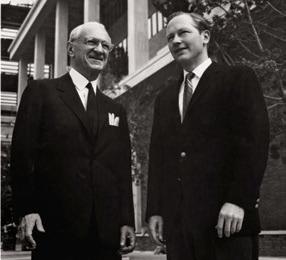
On the afternoon of June 25, 2025, the Jules Stein RPB Auditorium welcomed faculty, donors, colleagues, staff, and distinguished guests for the premiere of Jules Stein Eye Institute: A Celebration of Our Founders. The documentary, featuring Bradley R. Straatsma, MD, JD, founding chair of the UCLA Department of Ophthalmology and founding director of the Jules Stein Eye Institute, offers a personal reflection on his pioneering career, his close partnership with Dr. Jules Stein, and the formative years of the Institute.
The premiere concluded with a reception where attendees congratulated Dr. Straatsma and shared stories honoring his extraordinary years of leadership and vision.
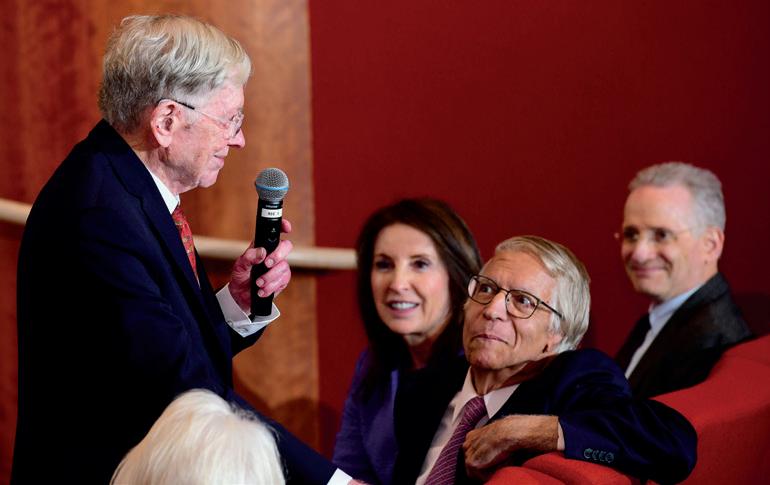

Bottom: L to r:
through years
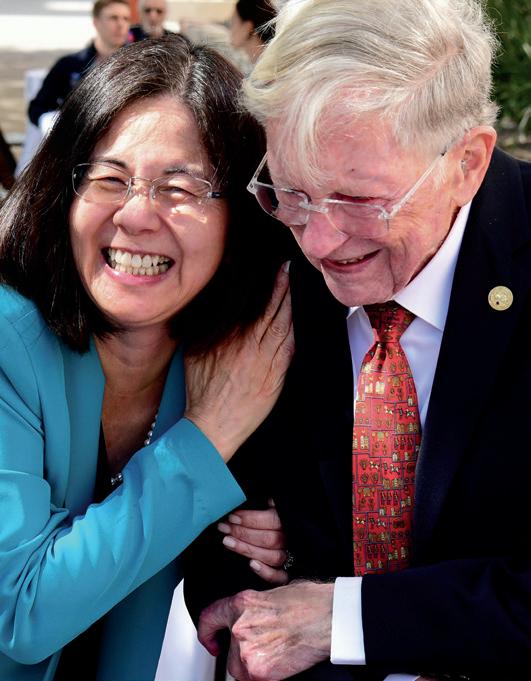
Dr. Melissa Chun (left) served as the optometrist for Dr. Straatsma’s patients and considers Dr. Straatsma a trusted mentor and cherished colleague.
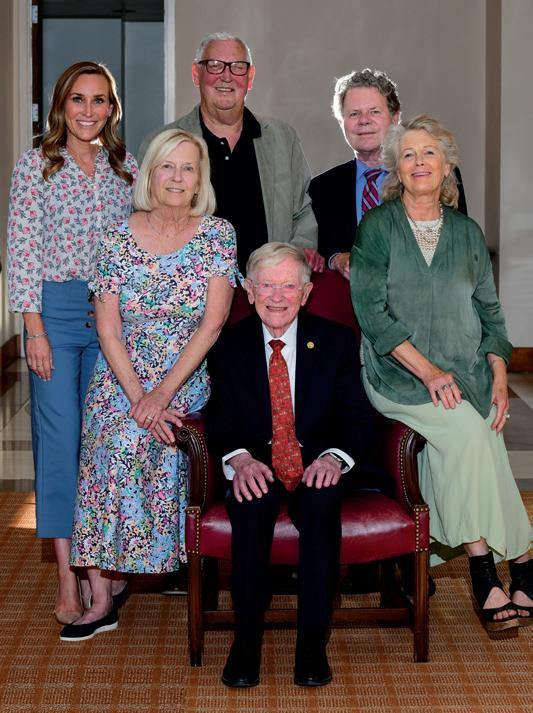
Dr. Straatsma (seated) with his family (l to r): daughter Cary, granddaughter Carlin, son-in-law Sam, son Derek, and daughter Greer (not shown, grandson Cavan and great-grandchildren).
Dr. Straatsma’s late wife, Ruth, co-founded the Institute’s volunteer arm and was an active member of the Advisory Board. During Ruth’s tenure, vital community outreach programs were established, providing education and visionscreening services to children.
The Association of University Professors of Ophthalmology (AUPO) held its 2025 annual meeting in Fort Lauderdale, Florida, from January 29 to February 1. The meeting served as an important forum for academic leaders in ophthalmology—including department chairs, vice chairs, research and residency directors, medical student educators, administrators, and program coordinators—to engage in focused discussions on the pressing issues facing the field.
Key topics included future training pathways in neuro-ophthalmology, pediatric ophthalmology, and uveitis, the evolving landscape of virtual versus in-person residency interviews, and strategies for leadership development in academic medicine.
Members of the UCLA Department of Ophthalmology were active participants, delivering valuable presentations that contributed to the exchange of ideas and initiatives shaping the future of academic ophthalmology.
The Doheny and Jules Stein Eye Institutes had a strong and visible presence at the 2025 Association for Research in Vision and Ophthalmology (ARVO) annual meeting, held May 4–8 in Salt Lake City, Utah. With nearly 11,000 attendees from 74 countries, ARVO remains the world’s premier gathering for vision researchers and ophthalmologists.
This year’s meeting was especially significant, as it was led by ARVO President Dr. SriniVas Sadda of the UCLA Department of Ophthalmology. Dr. Sadda played a key role in shaping the conference and its theme, “i3: Imagining Innovation and Intelligence in Vision Science,” which highlighted transformative advances in AI, CRISPR, and related technologies. Dr. Sadda also delivered the opening keynote and presented recent findings from his research laboratory.
UCLA faculty, trainees, and researchers contributed across the program, with numerous poster sessions, paper presentations, and faculty-led minisymposia. At the shared Stein/Doheny Expo booth, more than 1,500 attendees stopped by to connect with faculty and staff to learn more about our Department’s latest research innovations.
Looking forward, ARVO 2026 and ARVO 2027 will continue the Department’s remarkable legacy of visionscience leadership on the global stage, with Sophie X. Deng, MD, PhD, serving as ARVO president for the 2025–26 term and Joseph L. Demer, MD, PhD, taking up the mantle of ARVO president for the 2026–27 term.
Over 60 attendees joined the annual Doheny–UCLA Breakfast Forum on May 4 for a compelling session on “Oculomics: Accelerating Discovery of Systemic Disease Mechanism.” Held at the start of ARVO in Salt Lake City, the forum brought together world-renowned experts Amani Fawzi, MD, Yali Jia, PhD, and Jianhua
Wang, MD, PhD, to share groundbreaking insights on how retinal imaging is revolutionizing the diagnosis and understanding of systemic diseases.
Oculomics holds the promise of early, non-invasive disease detection, leading to better healthcare solutions for all.
Deborah Ferrington, PhD, Doheny chief scientific officer, and Yuhua Zhang, PhD, hosted, with Giulia Corradetti, MD, serving as the moderator.
A Night to Remember at the 2025 ARVO Alumni Reception
More than 150 Doheny and Jules Stein Eye Institute alumni, faculty, and friends gathered at Le Méridien Salt Lake City Downtown on May 5, to reconnect with colleagues from across the country.
Among the distinguished guests were James Tsai, MD, president of New York Eye and Ear Infirmary of Mount Sinai; Martin Heur, MD, chair of Ophthalmology at USC; and Brian Hofland, PhD, president of Research to Prevent Blindness—underscoring the national reach and impact of our alumni community.
Thank you to everyone who joined us for this memorable evening of food, drinks, and camaraderie. We’re already looking forward to next year’s celebration in Denver.
ARVO 2025 Awardees and Pre-ARVO Research Competition Winners
Congratulations to medical student Nhuan (Nathan) Vu , recipient of the prestigious Knights Templar Eye Foundation Travel Grant at this year’s ARVO annual meeting. Cerne Soylu, Yu-Chien Chung , Hyunduck Kwak , and Mahesh Agarwal were winners of the Doheny Pre-ARVO Competition for Excellence in Research Projects. Thank you to the Doheny Professional Alumni Association for underwriting these awards and helping to foster the next generation of vision researchers.
On March 4, 2025, the Doheny Eye Institute celebrated a major milestone with the ribbon-cutting of the new clinic in Pasadena. Now located on the first floor of 150 N. Orange Grove Blvd., the Doheny Eye Center UCLA–Pasadena brings together operations previously spread across multiple suites at Huntington Pavilion. Situated on the scenic Doheny Eye Institute campus, the modern, centralized facility is designed to elevate patient care, encourage collaboration, and usher in a new chapter in the longstanding partnership between Doheny and UCLA’s Jules Stein Eye Institute in advancing excellence in ophthalmology.

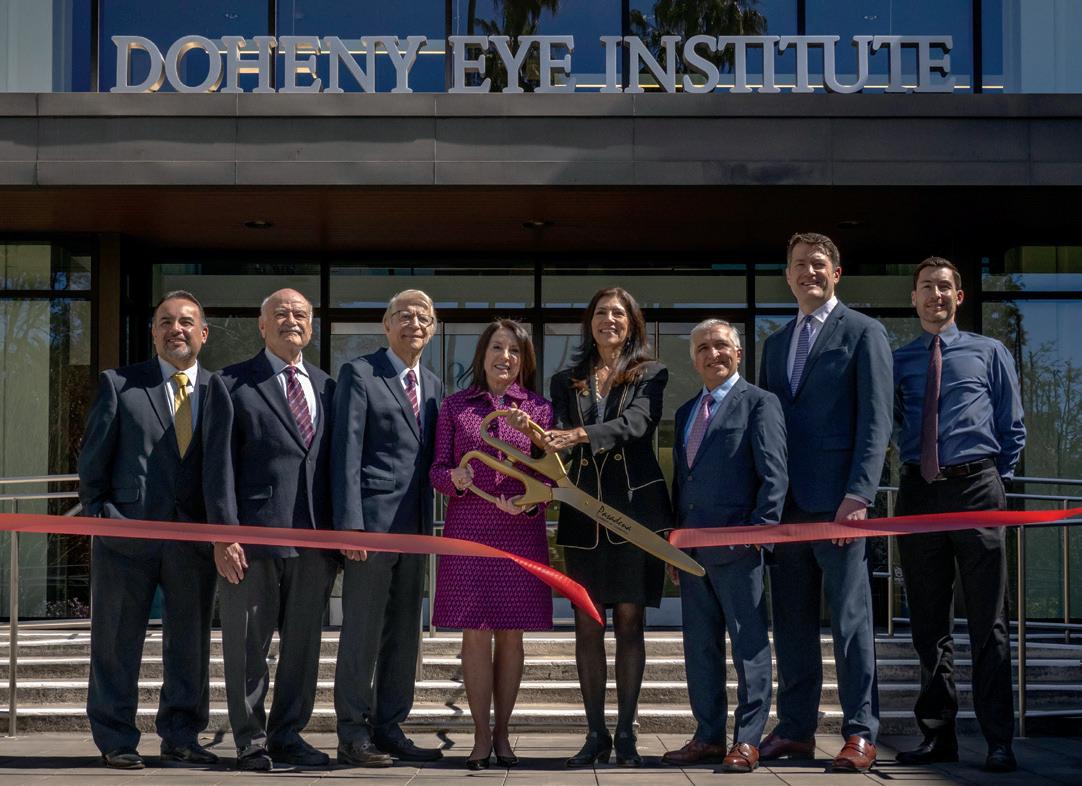
Since opening on February 17, 2015, the UCLA Stein Eye Surgery Center at the Edie & Lew Wasserman Building has become a cornerstone of ophthalmic care at the Jules Stein Eye Institute. Designed to redefine patient care and surgical innovation, it has delivered on that promise—ten years and nearly 80,000 procedures later.
Equipped with state-of-the-art technology, the center supports subspecialtytrained surgeons performing everything from routine to highly complex procedures, always with a focus on patient comfort and successful outcomes.
In its first year, the center completed 6,393 surgeries. By December 2024, annual volume had risen to 9,293—a 45 percent increase that reflects both rising demand and the center’s reputation for excellence.
But the real impact lies beyond the numbers—in the patients whose vision and lives have been transformed.
“Our proudest achievement isn’t just growth,” says Anne L. Coleman, MD, PhD, chair of the UCLA Department of Ophthalmology and director of the Jules Stein Eye Institute. “It’s the trust we’ve earned from our community and the difference we make in each patient’s life.”
As it enters its second decade, the Center remains committed to delivering world-class, patient-centered surgical care with safety, efficiency, and compassion at its core. To our physicians, staff, patients, and community—thank you for 10 remarkable years. We look forward to the next chapter in our shared vision.
The Jules Stein Eye Institute hosted a symposium on April 7, 2025, honoring Debora B. Farber, PhD, a trailblazing scientist whose work has shaped the field of vision science and opened doors for women in biomedical research.
Dr. Farber began her career in Argentina as a chemist before pursuing postdoctoral research at UC Santa Barbara, where she studied cellular regulation by cyclic nucleotides—work that laid the foundation for her future discoveries.
In 1976, she joined the faculty at the Jules Stein Eye Institute, becoming one of its first female faculty members. She rose to full professor by 1984, received the Karl Kirchgessner Endowed Chair in 2001, and was named a UCLA Distinguished Professor in 2007.
Her research focused on the genetic and biochemical causes of retinal degeneration. Notably, she discovered that mutations in a second gene can cause ocular albinism, significantly advancing understanding of inherited eye diseases.
Beyond her research, Dr. Farber served as associate director of the Brain Research Institute, associate director of the Jules Stein Eye Institute, and co-chief of its Vision Science Division.
Her work earned continuous NIH funding, an NIH MERIT Award, and recognition from organizations including Research to Prevent Blindness and the Foundation for Fighting Blindness. She received the Proctor Medal from the Association for Research in Vision and Ophthalmology (ARVO), an honorary doctorate from the University of Göteborg, and numerous UCLA honors.
A respected leader and role model, Dr. Farber also served as trustee and vice president of ARVO, cementing her legacy in global vision science.

Congratulations to Drs. Anne L. Coleman, Michael S. Ip, SriniVas R. Sadda, and Alfredo A. Sadun of UCLA’s Department of Ophthalmology for being recognized among the Los Angeles Business Journal’s Top Doctors of 2025. This honor reflects their exceptional contributions to vision science and patient care. Their dedication advances the field of ophthalmology and positively impacts the Los Angeles community.
Steven A. Barnes, PhD, professor of ophthalmology and neurobiology, received a Glaucoma Research Foundation Shaffer Research Grant that provides $55,000 in seed money for collaborative glaucoma projects that target one or more of the Foundation’s strategic research goals.
Aya Barzelay Wollman, MD, PhD, health sciences clinical instructor, has been awarded a prestigious ARPA-H (Advanced Research Projects Agency for Health) grant as the UCLA principal investigator for Project VISION. Viability, Imaging, Surgical, Immunomodulation, Ocular preservation, and Neuroregeneration (VISION) Strategies for whole eye transplant, which aims to make whole eye transplantation a clinical reality and has the potential to revolutionize vision restoration.
Joseph Caprioli, MD, David May II Chair in Ophthalmology, presented the keynote lecture, “Evolving Toolkit for a Glaucoma Surgeon,” at the Curso Inaugural LXVIII Curso de Formación y Perfeccionamiento de Oftalmólogos on May 22, 2025, in Santiago, Chile.
Dr. Caprioli also gave the Steven Podos Lecture, “Retinal Ganglion Cell Recovery in Glaucoma,” at the Icahn School of Medicine at Mount Sinai, on June 5, 2025, in New York.
Anne L. Coleman, MD, PhD, Bradley R. Straatsma, MD, Endowed Chair in Ophthalmology, chair and executive medical director, Department of Ophthalmology, director, Jules Stein Eye Institute, and affiliation chair, Doheny Eye Institute, presented the Mansour Armaly Lecture “Has Risk Profiling Improved?” on March 21, 2025, at the University of Iowa Glaucoma Clinical Conference in Iowa City, Iowa.
Dr. Coleman also gave the Bascom Palmer Eye Institute Chair’s Lecture, “Neovascular Glaucoma,” on April 10, 2025, at the Bascom Palmer Eye Institute in Miami, Florida.
Joseph L. Demer, MD, PhD, Arthur L. Rosenbaum, MD, Chair in Pediatric Ophthalmology, presented the inaugural Gary L. Rogers and Don L. Bremer Lectureship in Ophthalmology, “Treating Strabismus Caused by Pathology of the Orbital Pulley System,” on April 10, 2025, at Ohio State University in Columbus, Ohio.
Deborah A. Ferrington, PhD, The Stephen J. Ryan–Arnold and Mabel Beckman Foundation Endowed Presidential Chair, was named Nonprofit Executive of the Year at the 2025 Los Angeles Business Journal Nonprofit and Corporate Citizenship Awards. The honor celebrates outstanding leadership and impact in the region.
Dr. Ferrington, who is also chief scientific officer at Doheny Eye Institute, was appointed president of the Research Directors Council, part of the Association of University Professors of Ophthalmology, for a one-year term, effective April 2025.
Kaustabh Ghosh, PhD, associate professor of ophthalmology, has been appointed as the holder of the Mary D. Allen Endowed Chair in Vision Research, which was previously held by Deming Sun, MD, now professor emeritus. Dr. Ghosh is a highly respected researcher and is the recipient of many honors and awards, including the competitive Catalyst Award for Innovative Research Approaches for age-related macular degeneration from Research to Prevent Blindness.
Michael James Gilhooley, MB, PhD, FRCOphth, received the Thomas and Susan Carlow Young Investigator Award from the North American Neuro-Ophthalmology Society. He was the 2025 recipient of the year for his work, “Features and surgical management of acquired esotropia associated with high myopia.”
Michael Kapamajian, MD, has been named chief of ophthalmology at Harbor-UCLA Medical Center. As chief, Dr. Kapamajian is responsible for the daily operations of the eye clinic at Harbor-UCLA, clinic staffing, staffing in the OR, and all administrative responsibilities. In addition, Dr. Kapamajian works closely with residents during their rotations at Harbor-UCLA, playing an integral part in their training.
Colin A. McCannel, MD, has been named as the new chief of the Retina Division of the Jules Stein Eye Institute. Nationally recognized for his work, Dr. McCannel is dedicated to advancing patient care, fostering collaborative research, and providing unparalleled retinal education to fellows and residents.
In addition, Dr. McCannel has been appointed as the Ahmanson Chair in Ophthalmology. This administrative chair is for the Retina Division chief to further research, education, and clinical care programs.
Kevin M. Miller, MD, Kolokotrones Chair in Ophthalmology, has been chosen as vice president/ president-elect of the American Society of Cataract and Refractive Surgery for 2025–26.
Bartly J. Mondino, MD, distinguished professor of ophthalmology, was awarded the S. Rodman Irvine Prize at the UCLA Department of Ophthalmology Annual Seminar on May 30, 2025. The Irvine Prize recognizes excellence in a Department of Ophthalmology faculty
member whose relationships with patients and students are exemplary, whose professional actions illustrate the finest traditions of the medical profession and the visionscience community, and whose teaching demonstrates a dedication to transmission of knowledge to future generations.
SriniVas R. Sadda, MD, A. Ray Irvine, Jr, MD, Endowed Chair in Clinical Ophthalmology, delivered the John H. Dunnington Lecture, “AI in Clinical Practice: Opportunities and Challenges,” at Columbia University on March 6, 2025, in New York.
Alfredo A. Sadun, MD, PhD, Flora L. Thornton Endowed Chair in Vision Research, presented the Daniel M. Jacobson Memorial Lecture, “From Castro to Quantum Mechanics: A Tunnel of Love” on March 19, 2025, at the North American Neuro-Ophthalmology Society (NANOS) annual meeting in Salt Lake City, Utah. The award is given by NANOS to one person each year for their lifetime of research.
Alapakkam P. Sampath, PhD, Grace and Walter Lantz Endowed Chair in Ophthalmology, received a National Institutes of Health (NIH) R01 grant. His project, “Physiology of retinal degeneration” aims to provide new information about the mechanisms the degenerating retina uses to accommodate photoreceptor loss, with the ultimate goal to help design new therapies for vision restoration.
David Sarraf, MD, health sciences clinical professor of ophthalmology, presented the Robert Machemer Lecture “PED and RPE Tears: How Can We Reduce Risk?” on March 26, 2025, in Snowmass, Colorado.
Dr. Sarraf delivered the Neil Della Memorial Lecture “PAMM Detection Can Prevent Blindness and Death” at the Australian and New Zealand Society of Retinal Specialists on June 14, 2025, in Melbourne, Australia.
Dr. Sarraf also gave the keynote lecture, “Type 4 MNV: A New Addition to the Classification of Neovascular AMD” on June 29, 2025, at Maculart in Paris, France.
Jayanth Sridhar, MD, chief of ophthalmology at Olive ViewUCLA Medical Center, was named co-editor-in-chief of Current Opinion in Ophthalmology effective 2025.
Dr. Sridhar was also co-course director of the March 20–22, 2025 Vit-Buckle Society annual meeting in Austin, Texas.
Victoria L. Tseng, MD, PhD, Jerome and Joan Snyder Chair in Ophthalmology, was appointed to the American Academy of Ophthalmology (AAO) Council. Dr. Tseng will serve as a liaison between the AAO and the California Academy of Eye Physicians and Surgeons (CAEPS), coordinating the implementation of joint activities and helping to develop council advisory recommendations in conjunction with the leaders of CAEPS.
Edmund Tsui, MD, MS, assistant professor of ophthalmology, was selected for the American Academy of Ophthalmology (AAO) Leadership Development Program (LDP) Class of 2026.
The LDP is an extremely competitive program providing both orientation and skill development to future leaders of state, subspecialty, and specialized interest societies. Dr. Tsui was nominated by the Association for Research in Vision and Ophthalmology.
Federico G. Velez, MD, Leonard Apt Endowed Chair in Pediatric Ophthalmology, presented the American Association for Pediatric Ophthalmology and Strabismus 10th Kushner Lecture on Duane syndrome on February 8, 2025 (virtually).
David S. Williams, PhD, Karl Kirchgessner Foundation Chair in Vision Science, received the Spring 2025 Research to Prevent Blindness (RPB) International Collaborators Award in support of his proposal, “Establishing better models for studying retinal degeneration and developing therapies for Usher syndrome type 1B.” Dr. Williams will be working on the project with collaborators from Germany.
In addition, Luke Nelson, a medical student from Howard University College of Medicine, received an RPB/ Johnson & Johnson Medical Student Eye Research Fellowship, which will enable him to take a year off from medical school and pursue his proposed research project, “The role of mitochondria in supporting photoreceptor outer segment phagosome degradation in retinal pigment epithelium” in the lab of his mentor, Dr. David Williams.
Joel Zylberberg, PhD, associate professor of ophthalmology, was appointed as Fellow of Learning in Machines and Brains at the Canadian Institute for Advanced Research (CIFAR).

Adrian Au, MD, PhD
Assistant Professor of Ophthalmology
Michael J.
Emma M. Lessieur, MD, PhD
Joel Zylberberg, PhD

Dr. Au is a retina specialist who completed the EyeSTAR ophthalmology residency and vitreoretinal surgery fellowship at the UCLA Jules Stein Eye Institute. He is a former Heed Fellow and Michel’s Retinal Fellow, with expertise in the diagnosis and management of age-related macular degeneration, diabetic retinopathy, retinal vein occlusion, and other macular disorders.
Dr. Au is a faculty member in the Retina Division at UCLA, where he is actively engaged in clinical care, research, and education. His academic work focuses on the integration of artificial intelligence, retinal imaging, and genomics to identify imaging-based biomarkers and genetic risk factors. His ultimate goal is to advance precision medicine approaches that personalize diagnosis, predict disease progression, and optimize treatment outcomes for patients with retinal disease. He also mentors medical students, residents, and fellows, contributing to the next generation of clinician-scientists.
LOCATIONS: Jules Stein Eye Institute in Westwood and Harbor-UCLA Medical Center in Torrance.
Assistant Professor of Ophthalmology
Dr. Gilhooley is a surgeonscientist with clinical expertise in adult strabismus and neuro-ophthalmology. His research focuses on genetics with a particular interest in inherited optic neuropathies.

Originally from Scotland, Dr. Gilhooley completed his medical degree at the University of Cambridge and earned a PhD from the University of Oxford. He completed his ophthalmology residency and a fellowship in adult strabismus at Moorfields Eye Hospital in London, United Kingdom. He later undertook further subspecialty training in neuro-ophthalmology, with a fellowship at the University of Colorado.
Dr. Gilhooley’s research has been published in leading peer-reviewed journals. He is a recipient of the NANOS Carlow Young Investigator Award and actively contributes to the field through roles on several professional committees and journal editorial boards.
In clinical practice, Dr. Gilhooley focuses on the evaluation and management of the full spectrum of neuro-ophthalmic disorders, as well as complex strabismus and other oculomotor disturbances.
LOCATIONS: Jules Stein Eye Institute in Westwood and Doheny Eye Center UCLA–Pasadena.
Assistant Professor of Ophthalmology
Dr. Lessieur is a scientist who studies what causes retinopathy in diabetes, and how it can be prevented. Efforts in her lab are focused on understanding the cellular and molecular mechanism that led to the disease and the development of novel unconventional therapies to halt the progression of the retinopathy.
Associate Professor of Ophthalmology
Dr. Zylberberg is a neuroscientist who studies the transmission of visual information along the optic nerve. His laboratory specializes in developing new computational frameworks—typically using machine learning and artificial intelligence—to integrate information from many different experiments.
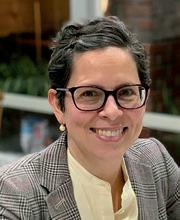
Dr. Lessieur earned her medical degree from the Universidad Autónoma de Tamaulipas in Mexico and completed her PhD in Molecular Medicine at the Cleveland Clinic Lerner College of Medicine of Case Western Reserve University in Cleveland, Ohio. During her postdoctoral training at the University of California, Irvine, under Professor Timothy Kern, she investigated how extracellular vesicles mediate immune signaling in the early stages of diabetic retinopathy. Her innovative work is supported by a prestigious K99/R00 MOSAIC Career Transition Award from the National Eye Institute. She joined UCLA in May 2025.
LOCATION: Doheny Eye Institute, Pasadena

Dr. Zylberberg completed his PhD in Physics at UC Berkeley and then underwent postdoctoral training at the University of Washington, where he worked with retinal neuroscientist Fred Rieke and applied mathematician Eric Shea-Brown. He started his own laboratory and held his first faculty position at the University of Colorado School of Medicine before moving to York University in Toronto, where he served as Canada Research Chair in Computational Neuroscience. Dr. Zylberberg’s work has received funding from Google, the Sloan Foundation, National Institutes of Health, Canadian Institute for Advanced Research, and Canada’s Natural Sciences and Engineering Research Council. He joined UCLA in January 2025.
LOCATION: Jules Stein Eye Institute, Westwood
The Alcon Vision Advanced Cataract Surgery Course, led by Course Director Kevin M. Miller, MD, chief of the Cataract and Refractive Surgery Division, took place on April 5, 2025. The event was a major success, featuring a variety of hands-on labs, including sessions on LenSx FLACS, PRK preparation, Argos biometry, B-scan ultrasonography, and more. Participants engaged directly with Alcon representatives and faculty instructors to gain practical experience using surgical tools and simulation technologies. Approximately 55 trainees enrolled in the course, and numerous faculty members from the Department generously contributed their time as volunteer instructors.

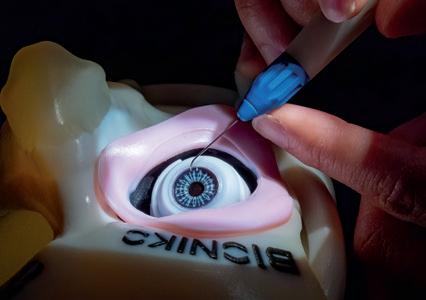
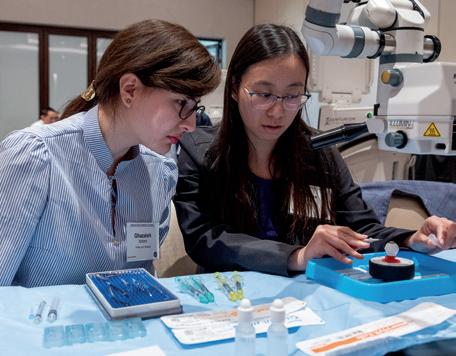
Attendees of the Advanced Cataract Surgery Course gain hands-on experience with the same surgical machines used in real cataract procedures under the guidance of expert faculty and Alcon representatives.
The 3rd Annual DohenyUCLA International Retina Symposium, held on February 1, 2025, was a resounding success, drawing over 100 participants to Doheny Eye Institute. The event brought together distinguished speakers such as David Boyer, MD, David Sarraf, MD, and Hendrik P.N. Scholl, MD, MA, FARVO, alongside other leading retina specialists from the Jules Stein, Roski, and Gavin Herbert Eye Institutes. Under the direction of course organizers Michael Ip, MD, and Kirk Hou, MD, PhD, the symposium delivered an exceptional program focused on the latest advances in imaging, artificial intelligence, and therapeutic innovations in retinal care.
The 2025 Doheny Distinguished Lecture Series began on February 7 with a presentation by Rajendra Apte, MD, PhD, of Washington University School of Medicine in St. Louis. A former fellow of SriniVas R. Sadda, MD, Dr. Apte shared new insights in his talk, “Marching Upstream: The Battle Against Age-Related Macular Degeneration.” The series continued with Robert Mullins, MS, PhD (March 25), on complement overactivity in AMD, and Julia Busik, PhD, FARVO (April 25), on diabetic retinopathy as a ceramidopathy. The series underscores the importance of knowledge-sharing and collaboration in advancing vision science and improving outcomes for patients affected by blinding diseases.
The UCLA Jules Stein Eye Institute hosted an International Master’s Symposium on Thyroid Eye Disease on February 21–22, 2025. Directed by Daniel B. Rootman, MD, the sold-out symposium drew an audience of expert orbital surgeons from around the world. Faculty and trainees, including Dr. Rootman, Justin Karlin, MD, Steven Leibowitz, MD, Katie Lucarelli, MD, Angela Oh, MD, Maria Quintero, MD, and Robert Goldberg, MD, were joined by guest faculty Ray Douglas, MD (Beverly Hills), Rona Silkiss, MD (San Francisco), Terry Smith, MD (Ann Arbor), Michael Kazim, MD (New York), Andrea Kossler, MD (Stanford), Tomoyuki Kashima, MD (Tokyo), Milind Naik, MD (Hyderabad), Guy Ben Simon, MD (Tel Aviv), Augusto Cruz, MD (São Paulo), and Jack Rootman Lecturer, Geoffrey Rose, MD (London).
In the dissection lab, masterslevel orbital surgery demonstrations were performed by the faculty, and then the participants performed surgery with one-on-one teaching. Laboratory instructors included Cynthia Boxrud, MD, Bruce Becker, MD, Louis Savar, MD, Aaron Savar, MD, Polly McKinstry, MD, Ken Steinsapir, MD, Jonathan Hoenig, MD, Mehryar Taban, MD, and video director Steven Leibowitz, MD
The Ophthalmic Knowledge Assessment Program (OKAP) is a standardized 260-question multiple-choice exam administered annually to ophthalmology residents across the United States and Canada. The exam is designed to evaluate residents’ ophthalmic knowledge relative to their peers at similar stages of training.
To support exam preparation, a two-day OKAP Review Course was held on February 21 and 22, 2025—hosted at UCLA’s Jules Stein Eye Institute on the first day and USC on the second. The course was organized by Amanda Lu, MD, and Mitra Nejad, MD, from UCLA, along with Annie Nguyen, MD, from USC’s Roski Eye Institute.
The joint effort provided residents from both UCLA and USC the opportunity to learn from faculty across both institutions. While this was the first year the course was offered, organizers plan to make it an annual event leading up to the OKAP exam, typically administered in mid-March.
The American Glaucoma Society (AGS) annual meeting in Washington, DC, February 26 to March 2, 2025, brought together specialists to exchange insights into the clinical and surgical management of glaucoma. Ninety AGS members participated in Advocacy Day on Capitol Hill, underscoring the profession’s
dedication to shaping national health policy.
Members of the UCLA Department of Ophthalmology were active meeting participants:
f Sajad Besharati, MD (Dr. Nouri-Mahdavi’s lab): Presenter, “Top 5 Plenary Paper Presentations: Racial Disparities in Outcomes of Initial Trabeculectomy with Mitomycin C: A Comparative Study of Patients of Hispanic and European Descent”
f Vikas Chopra, MD: Moderator, Symposium: Learning Never Stops, Member, Annual Program Committee
f Judy Figueroa, BS (Dr. Nouri-Mahdavi’s lab): Paper Presentation, “Long-Term Functional Outcomes in Patients with Initial Paracentral Visual Field Loss”
f Simon K. Law, MD, PharmD: Presenter, “Early Lens Extraction with Intraocular Lens Implantation for the Treatment of Primary Angle-Closure Glaucoma (EAGLE) Trial”
f Kouros Nouri-Mahdavi, MD, MS: Program Committee Chair; Moderator, Paper session on AI/Diagnostics
f Alexandra Schulte, MD: Poster, “Twelve-Week Trial on the Safety and Efficacy of IOP-Lowering Microdrops Administered with the Nanodropper® in Glaucoma Patients”
f Victoria L. Tseng, MD, PhD: Moderator, Paper session on the Pathophysiology/ Genetics of Glaucoma.
15th Annual RIMR Conference: A Legacy of Scientific Collaboration in AMD
Over 110 academics, nine early-career investigators, and industry leaders from around the globe gathered at the Beckman Center in Irvine, California, for the 15th annual Ryan Initiative for Macular Research (RIMR) conference from March 26–28, 2025. This year’s Gerald Lutty Memorial Lecture was delivered by Vinit Mahajan, MD, PhD, a Jules Stein Eye Institute alumnus, highlighting cutting-edge advances in retinal research.
Stein Distinguished Lecture Series
As part of its Distinguished Lecture and Research Seminar Series, the UCLA Jules Stein Eye Institute hosted two presentations: Dr. Justin Kumar, professor of biology, Indiana University, spoke on “Graded Transcription Factor Expression Mediates the Choice Between Distinct Organ Fates” on May 16, 2025, hosted by Dr. Alapakkam Sampath, chief of the Vision Science Division; and Dr. Michael Do, professor of neurology, Harvard Medical School, presented, “Varieties of Visual Information” on May 23, 2025, hosted by Dr. Greg Field, assistant director of research. Dr. Roxana Radu, Vernon O. Underwood Family Chair in Ophthalmology, serves as the faculty organizer and coordinator of this series.
The Medical Technology (MedTech) Innovation Seminar fosters a culture of innovation within the UCLA Department of Ophthalmology and seeks to inspire both faculty and students to engage in development of new medical technologies.
Held at the RPB Auditorium in the Jules Stein Eye Institute on May 21, 2025, the Seminar featured speakers who brought diverse perspectives and deep expertise in the field of MedTech:
f Dr. Boris Malyugin, inventor of the Malyugin Ring, offered attendees a rare look at how a transformative device goes from concept to widespread clinical use.
f Dr. Sean Ianchulev, an alumnus of the Doheny residency, professor of ophthalmology, and director of technology and innovation at New York Eye and Ear, discussed his novel approaches to interventional glaucoma treatment.
f Ed Beres, from UCLA Technology Development Group, highlighted UCLA resources available from MedTech development, a roadmap for would-be medical entrepreneurs.
The seminar showcased thought leadership in MedTech and reinforced UCLA’s commitment to establishing a strong and sustainable pipeline for turning ideas into impactful solutions.
11th Annual Pacific Retina Club and 12th Annual International Retinal Imaging Symposium
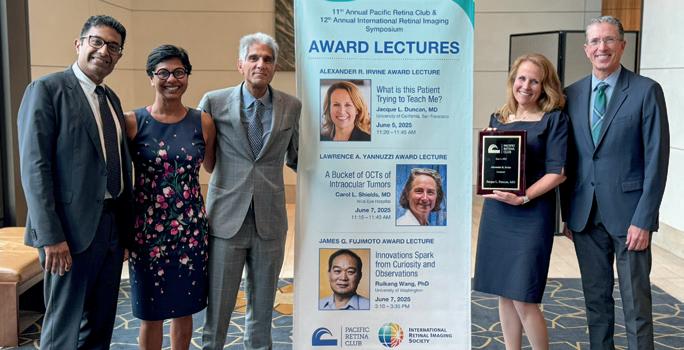

The International Retinal Imaging Society (IntRIS) joined forces with the Pacific Retina Club for a combined meeting June 5–7, 2025, at the UCLA Meyer & Renee Luskin Conference Center.
The Pacific Retina Club unites retina specialists who share expertise on the evaluation and management of retinal diseases. This year’s program featured innovative topics, including cutting-edge surgical techniques, imaging advances, and emerging therapies for both wet and dry age-related macular degeneration. The meeting also addressed the latest care guidelines for retinal vascular disorders, pediatric and inherited retinal diseases, intraocular tumors, and uveitis.
The International Retinal Imaging Symposium brought together global experts with a shared mission to advance science, knowledge, and innovation in retinal imaging.
With nearly 185 attendees, the joint meeting offered a dynamic platform of case presentations, scientific lectures, and expert panel discussions led by authorities in the field of retinal disease and imaging. Highlights included Dr. Jacque Duncan, who delivered the 17th Alexander R. Irvine Lecture; Dr. Carol Shields, who gave the 6th Lawrence A. Yannuzzi Award Lecture; and Dr. Ruikang Wang, who presented the inaugural James G. Fujimoto Lecture
Course organizers were Drs. David Sarraf, Amani Fawzi, J. Michael Jumper, H. Richard McDonald, Phil Rosenfeld, and SriniVas Sadda
UCLA Department of Ophthalmology
2025 Annual Seminar
The Department of Ophthalmology held its Annual Seminar on May 30, 2025, at the UCLA Stein Eye Institute’s RPB Auditorium. The educational event covers current clinical and research aspects of selected ophthalmic subspecialties. The Seminar was highlighted by the following lectures:
55th Jules Stein Lecture
Joan W. Miller, MD
Developing treatments for age-related macular degeneration: The road we travelled and the road ahead
55th Doheny Memorial Lecture
Jane C. Edmond, MD
Discs in disguise: Unmasking buried optic disc drusen from papilledema
22nd Bradley R. Straatsma Lecture
M. Roy Wilson, MD, MS
Rethinking race in biomedical research: View from the national academies and personal reflections
22nd Thomas H. Pettit Lecture
Reza Dana, MD, MSc, MPH
New ways of doing old things: Translational investigations in management of common corneal and ocular surface disorders
The 2025 Excellence in Research Awards were also presented at the Seminar. Congratulations to Resident Angela Chen, MD, Clinical Fellow Blake Fortes, MD, International Research Fellow Alessandro Feo, MD, and Postdoctoral Fellow Junqiang Wang, PhD, on receiving this award for their exceptional research projects.
Bartly J. Mondino, MD, distinguished professor of ophthalmology, received the S. Rodman Irvine Prize, an award recognizing outstanding achievement by a faculty member in the UCLA Department of Ophthalmology.
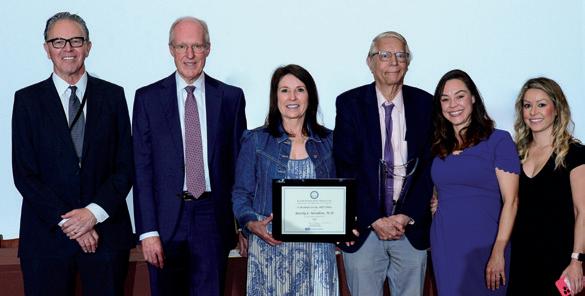
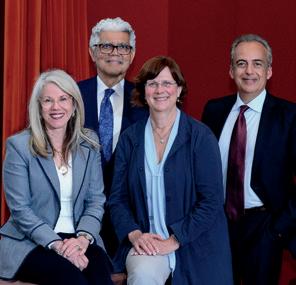
Congratulations to J. Bronwyn Bateman, MD, Department of Ophthalmology alumna, on receiving the 2025 Gradle Medal for Good Teaching from the Executive Committee of the Pan-American Association of Ophthalmology (PAAO). Dr. Bateman was recognized with this honor at the Opening Ceremony of the PAAO in Bogota, Colombia, on May 30, 2025.
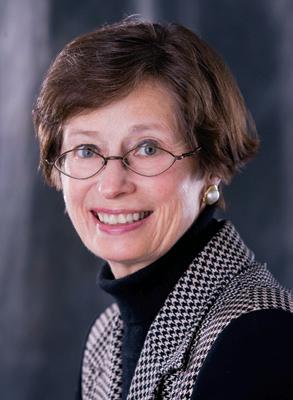
The Harry S. Gradle Medal is one of the highest honors conferred by the PAAO and recognizes excellence in teaching and education in the field of ophthalmology. This award honors a professor ophthalmologist who has demonstrated leadership in developing, implementing, or maintaining an outstanding training program and/ or continuing education in the field of ophthalmology. The awardee exemplifies excellence and promotes best practice in education, and the awardee promotes positive relationships between the training program and the community and has been an advocate and leader in the field of ophthalmology.
David Hwang, MD, FACS, professor and vice chair at the University of California and holder of the Pearl T. Kimura and Samuel J. Kimura MD Endowed Chair in Ophthalmology, was honored as Doheny Eye Institute’s 2025 Distinguished Alumnus on March 29, 2025, at Doheny’s annual CME Conference and Alumni Dinner. The award recognizes alumni from Doheny’s resident or fellowship program who have made sustained or impactful contributions to the field of ophthalmology.
for a reception hosted by UCLA Ophthalmology Alumni Association and the Doheny Eye Institute Professional Alumni Association at the
2025 American Academy of Ophthalmology Annual Meeting
Saturday, October 18, 2025
5:30–7:30 PM reception
7:30–9:30 PM music & dancing
HYATT REGENCY ORLANDO
Florida Ballroom B-C 9801 International Dr., Orlando, FL 32819
Dr. William C. Stivelman’s journey into ophthalmology was deeply personal, sparked by his own battle with keratoconus from a young age. Under the mentorship of Dr. Max Fine at UCSF, who performed his corrective surgeries, he forged a path that seamlessly blended clinical expertise with profound humanitarianism.
After completing his medical training and a fellowship at UCSF/Mount Zion, Dr. Stivelman established a thriving ophthalmology practice, later forming a 28-year partnership with retina specialist Dr. Joel Corwin. His commitment to education led him to UCLA’s Jules Stein Eye Institute, where he served as associate clinical professor of ophthalmology for 28 years, shaping the next generation of ophthalmologists. “Growing up a block from UCLA, and with both parents as alumni, I always felt a strong connection to the Institution,” he explains.
Dr. Stivelman’s impact, however, extends far beyond the clinic and lecture hall. A pivotal moment came during his internship in Santa Barbara when he reconnected with his second cousin, Jules Oakley. This meeting ignited a shared vision to support seniors with dementia, leading to the establishment of The Mary Oakley Foundation in 1995, named in honor of Mr. Oakley’s late wife.
“My parents always emphasized the importance of giving back,” Dr. Stivelman reflects, citing a family tradition of pro bono work and community service. This ethos drives the Foundation’s mission to improve the lives of needy seniors with dementia in Ventura, Santa Barbara, and San Luis Obispo counties.
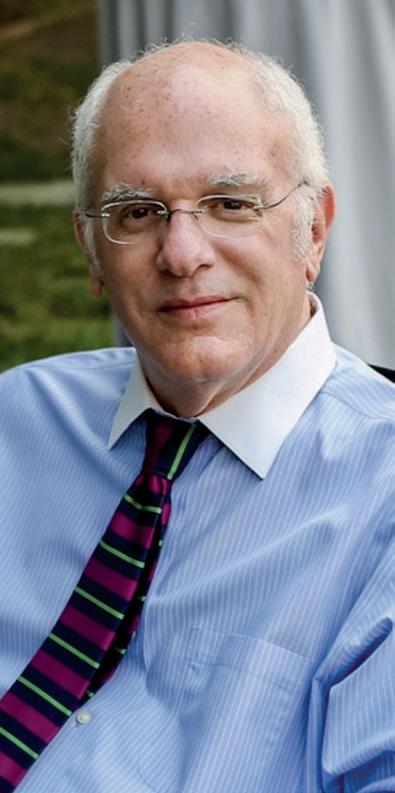
The Foundation’s initiatives include crucial respite and senior daycare grants, providing vital support to families facing the challenges of neurodegenerative diseases. Dr. Stivelman emphasizes the importance of ensuring the integrity of grant recipients, a responsibility he takes seriously. “We carefully interview our prospective candidates,” he notes, balancing the risks inherent in philanthropic endeavors with a commitment to responsible stewardship.
A significant milestone for the Foundation was the establishment of The Mary Oakley Foundation Chair in Neurodegenerative Diseases at the Jules Stein Eye Institute. “We wanted to ensure our funds were used for neurodegeneration research,” Dr. Stivelman explains, praising the Institute’s commitment to rigorous, well-considered advancements. This initial endowment was followed by professorships at UCSF and UC Davis, all focused on advancing neurodegenerative research.
When asked about the impact of his giving, Dr. Stivelman points to both statistical reports and heartfelt personal stories from grant recipients. “We receive a steady stream of letters expressing gratitude,” he says, underscoring the tangible difference the Foundation makes in people’s lives.
Dr. Stivelman’s dual dedication to ophthalmology and philanthropy reflects a profound understanding of the interconnectedness of health and humanity. His work embodies a vision for giving, not only sight but also hope and support to those in need. He expresses great respect for the Jules Stein Eye Institute, “The individuals running the Institute, especially the principals, are here for a career, not as a stepping-stone to another laurel on their ascents to greater accomplishments. Throughout my entire professional practice of almost 28 years, I could always call the same people, reach them effortlessly, and have meaningful exchanges about patients, patient care, and institutional research options for our patients. And so, I have great respect for the Institution and the individuals who have made it what it is.”
My parents always emphasized the importance of giving back.
Dr. William Stivelman
To honor the teaching and mentoring of two leading retinal physicians and vision-science researchers, Dr. Alan L. Norton created the Allan E. Kreiger, MD, and Jerome T. Pearlman, MD, Endowed Lectureship to fund lectures and meetings for exchanging research and information among members of the global academic community. While the primary focus is on retina research, it is for sharing any significant academic research findings that can advance ophthalmology.
Dr. Allan “Buzz” Kreiger joined the UCLA Department of Ophthalmology in 1967, becoming founding chief of the Retina Division in 1976. “Dr Kreiger led an outstanding retinal disease and surgery research, training, and patient care program by leading vitreoretinal education programs, conducting substantial research, and steadily advancing patient care activities,” says Bradley Straatsma, MD, JD, founding chair of the Department of Ophthalmology and founding director of the Jules Stein Eye Institute. “He substantially advanced the academic activity of our Department.”
“Dr. Kreiger personified the highest standards in patient care, education, and mentorship,” says Bartly J. Mondino, MD, former Department chair and Institute director. “He was beloved by faculty, trainees, and patients alike. He was an expert at diagnosing and treating complex forms of retinal diseases and contributed instrumentation and techniques to the profession and published studies that added to the world’s literature.”
Dr. Jerome “Jerry” Pearlman also joined the UCLA Department of Ophthalmology in 1967. “His intelligence, integrity, and intrepid spirit were among the qualities that contributed to his lifetime of professional distinction and substantial scientific accomplishment,” says Dr. Straatsma. “Among his scientific accomplishments were his research on retinitis pigmentosa, his clinical studies on retinal physiology, and his laboratory investigations of retinal degenerations. In addition, he was an effective teacher. H e devoted countless hours to the education of medical students, residents, and postdoctoral fellows.”

Dr. Allan E. Kreiger Founding Chief, Retina Division
To Dr. Norton who knew both men, “ Buzz and Jerry were two very special people. They were both outstanding in academics and patient care. What made them special to me was their humanity. They were close friends with each other and had similar interests, who always wanted to give the best care to their patients. With Jerry’s early passing, it seemed like a hole had been made in the Department. Soon, younger outstanding faculty would fill the ranks of the Institute, but no one could fill the void of Buzz and Jerry.”
The Jules Stein Eye Institute deeply appreciates Dr. Norton for sustaining the legacies of Drs. Kreiger and Pearlman through this lectureship, ensuring their impact on future generations.
The Department of Ophthalmology celebrated the graduation of its residents and fellows at the UCLA Luskin Conference Center on June 24, 2025. Witnessing our graduates’ hard work, resilience, and growth has been inspiring, and we look forward to celebrating their achievements and supporting them as valued alumni in the next chapters of their lives.
At the graduation, residents, fellows, and faculty were also honored for excellence:
Teaching Award
Mark Volpicelli, MD
Fellowship Faculty Teaching Award Hamid Hosseini, MD
Resident Teaching Award Angela Chen, MD
Resident Teaching Award
Alan Kong, MD
Fellow Teaching Award Bryan Zarrin, MD
Angela Chen, MD
Cornea Fellowship Mass Eye and Ear Boston, MA
Erika M. Ellis, MD, PhD
Cornea Fellowship
UC Davis Davis, CA
Elise L. Ma, MD, PhD
Cornea Fellowship
Jules Stein Eye Institute Los Angeles, CA
Lukas Mees, MD
Refractive Surgery Fellowship
Dr. Luke Rebenitsch Oklahoma City, OK
Yaqoob Qaseem, MD
Retina Fellowship University of Colorado Boulder, CO
Sagar H. Rambhia, MD Private Practice
Junru Yan, MD
Cornea Fellowship UC Irvine Irvine, CA
Kelly H. Yom, MD
Glaucoma Fellowship
Jules Stein Eye Institute Los Angeles, CA
Graduating
Adrian Au, MD, PhD
Retina Fellow (Stein) Faculty, UCLA Los Angeles, CA
Christian Bardan, MD
Cornea Fellow (Stein) Faculty, Loma Linda University Loma Linda, CA
Blake Fortes, MD
Retina Fellow (Stein) Private Practice
Roxana Godiwalla, DO
Cornea Fellow (Doheny) Private Practice
Robert Gunzenhauser, MD Glaucoma Fellow (Stein) Private Practice
Thanh-Liem Hyunh-Tran, MD
Neuro-Ophthalmology Fellow (Stein/Doheny)
Neurology Fellowship, UCLA Goldberg Migraine Program
Katherine Lucarelli, MD Oculoplastics Fellow (Stein) Faculty, University of Colorado
Boulder, CO
Marko Popovic, MD, MPH Retina Fellow (Stein) Faculty, University of Toronto Toronto, Ontario, Canada
Alexandra Schulte, MD Glaucoma Fellow (Stein)
U.S. Air Force
Adam Tanaka, MD
Glaucoma Fellow (Doheny) Private Practice
Bryan Zarrin, MD
Cornea Fellow (Stein) Private Practice
Destinations of 2025 Graduating International Fellows
Rouzbeh Abbasgholizadeh, MD
Retina International Fellow (Doheny)
Not determined
Mai Brakat Alhelaly, MD
Retina International Fellow (Doheny)
Not determined
Cherie Yu Chien Chung, MD, PhD
Retina International Fellow (Doheny)
Fu Jen Catholic University Hospital
New Taipei City, Taiwan
Tal Eshkoly Lior, MD
Retina International Fellow (Stein)
Retinal Genetics and Uveitis Fellowship
Jules Stein Eye Institute Los Angeles, CA
Alessandro Feo, MD
Retina International Fellowship (Stein)
Completing residency in Milan, Italy
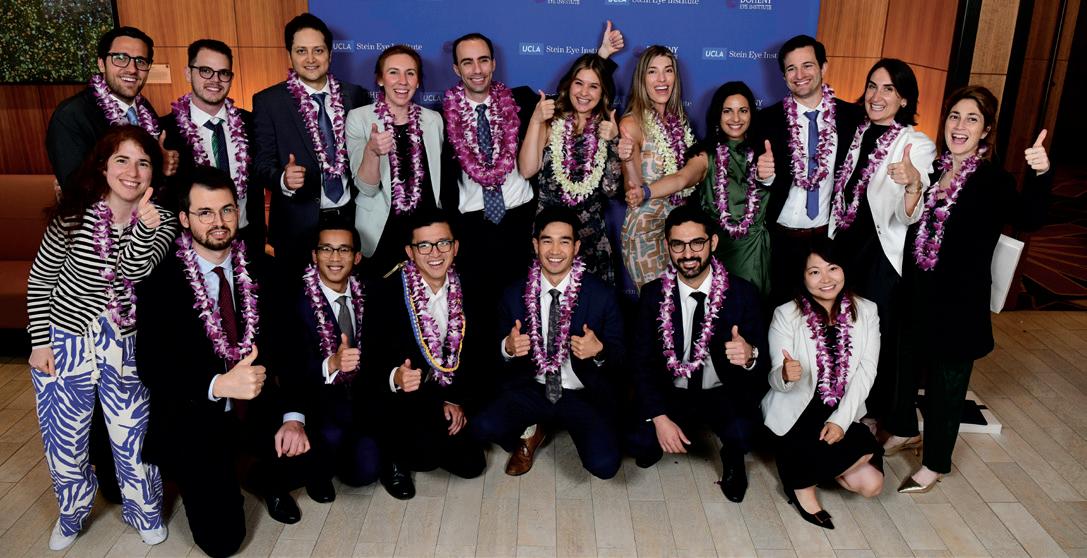
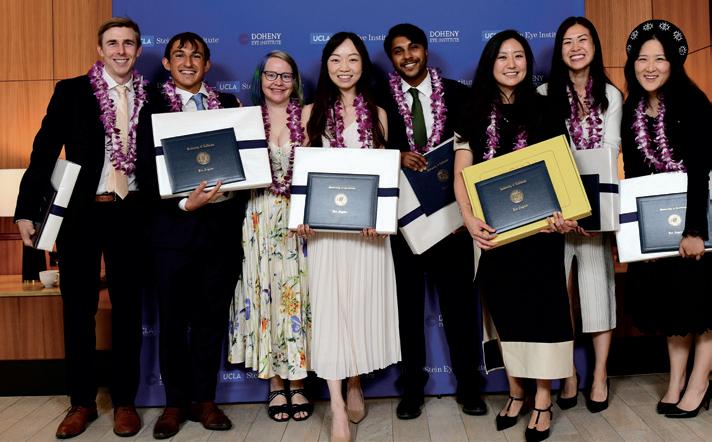
Hyunduck Kwak, MD
Retina International Fellowship (Doheny)
Inje University
Busan Paik Hospital Busan, South Korea
Kwanghyun Lee, MD, PhD
Glaucoma International Fellowship (Stein)
Not determined
Mostafa Mafi, MD
Retina International Fellowship (Stein)
Flaum Eye Institute Rochester, NY
Qingyu Meng, MD
Pediatric Ophthalmology International Fellowship Peking University People’s Hospital Beijing, China
Kang Yeun Pak, MD
Retina International Fellowship (Doheny)
Inje University
Busan Paik Hospital Busan, South Korea
Nutsa Pargalava, MD Neuro-Ophthalmology International Fellowship (Stein/Doheny)
Not determined
Maria Paula Quintero Mutis, MD Oculoplastics International Fellowship (Stein) La Fundación Oftalmológica de Santander Santander, Colombia
Ceren Soylu, MD
Retina International Fellowship (Doheny)
Not determined
He Ye, MD, PhD
Retina International Fellowship (Doheny)
Tianjin Medical University Eye Hospital Tianjin, China
The UCLA Jules Stein Eye Institute welcomes the 2029 incoming class of residents who began their residency on July 1, 2025.
Hansen Dang, MD
Roy J. and Lucille A. Carver College of Medicine University of Iowa
Justin Hanson, MD
David Geffen School of Medicine at UCLA
Brittany Marks, MD University of Colorado School of Medicine
Leah Rosen, MD Weill Cornell Medical College
Jacob Streinikov, MD Washington University School of Medicine in St. Louis
Paulina Truong, MD
Baylor College of Medicine
Daniel Wang, MD
Duke University School of Medicine
Ashley Zhou, MD Columbia University College of Physicians and Surgeons
JULES STEIN EYE INSTITUTE
Clinical Fellows
Saghar Bagheri, MD, PhD Medical Retina
Melanie Daulton, MD Cornea
Kim Firn, MD, MS Neuro-Ophthalmology
Meghana Kalavar, MD, MHS Retina (1st Year)
Elise Ma, MD, PhD Cornea
A. Itzam Marin, MD
Retina (2nd Year)
Angela Oh, MD Oculoplastics (2nd Year)
Cherilyn Mae Palochak, MD Retina (2nd Year)
Ketaki Panse, MD Medical Retina
Tatiana Rosenblatt, MD Oculoplastics (1st Year)
Michael Saheb Kashaf, MD, MSc Glaucoma
Brian Soetikno, MD, PhD Retina (1st Year)
Prashant Tailor, MD Retina (2nd Year)
Kelly Yom, MD Glaucoma
DOHENY EYE
Clinical Fellows
Alexander Haueisen, MD Glaucoma
Hyelin You, MD Cornea
Incoming International Fellows
JULES STEIN EYE INSTITUTE
International Fellows
Marjan Afzali Behbahani, MD Medical Retina, Iran
Tal Eshkoly Lior, MD Medical Retina, Israel
Alessandro Feo, MD Uveitis, Italy
Shahin Faghihi Habibabadi, MD Medical Retina, Iran
Jung Lim Kim, MD, PhD Glaucoma, China
Arezoo Miraftabi, MD Glaucoma, Iran
Javier Moreno-Alemán Sánchez, MD Oculoplastics, Spain
Yasamin Mousavimotlagh, MD Retina, Iran
Sebastiano Nunziata, MD Pediatric Ophthalmology, Italy
Anamika Patel, MD Uveitis, India
Annisa Permadi, MD Cornea, Indonesia
Veronika Yehezkeli, MD Pediatric Ophthalmology, Israel
DOHENY EYE
International Fellows
Shinichiro Chujo, MD, PhD Retina, Japan
Maryam Golmohammadi, MD Neuro-Ophthalmology, Iran
Jianfeng Huang, MD Retina, China
Alberto Quarta, MD Retina, Italy
405 Hilgard Avenue
Box 957000, 100 Stein Plaza
Los Angeles, California, 90095-7000
U.S.A.
Forwarding Service Requested
UCLA Stein Eye Institute, Westwood
100 Stein Plaza, UCLA Los Angeles, CA 90095
Referral Service: (310) 794-9770 Emergency Service: (310) 825-3090
After-Hours Emergency Service: (310) 825-2111 uclahealth.org/eye
Stein Eye Center–Calabasas 26585 W. Agoura Rd., Suite 330 Calabasas, CA 91302 (310) 825-5000
Stein Eye Center–Santa Monica 1807 Wilshire Blvd., Suite 203 Santa Monica, CA 90403 (310) 829-0160
Doheny Eye Center UCLA–Arcadia 622 W. Duarte Rd., Suite 101 Arcadia, CA 91007 (626) 254-9010
Doheny Eye Center UCLA–Orange County
Orange Coast Memorial Medical Center 18111 Brookhurst St., Suite 6400 Fountain Valley, CA 92708 (714) 963-1444
Doheny Eye Center UCLA–Pasadena
Doheny Eye Institute
150 N. Orange Grove Blvd. Suites 1200, 1300, and 1400 Pasadena, CA 91103 (626) 817-4747











Alumni Relations
Email: alumni@jsei.ucla.edu
Philanthropy
Jules Stein Eye Institute Development Office 100 Stein Plaza, UCLA, Room 3-138 Los Angeles, CA 90095-7000
Telephone: (310) 206-6035
Email: giving@jsei.ucla.edu
Volunteer Opportunities Center for Community Outreach & Policy www.uclahealth.org/departments/ eye/mobile-eye Telephone: (310) 825-2195 Email: community@jsei.ucla.edu facebook.com/uclamobileyeclinic instagram.com/uclamobileyeclinic twitter.com/uclaMEC
Read past issues of EYE at: www.uclahealth.org/Eye/news
Send comments or questions to: Tina-Marie Gauthier
Managing Editor Email: Tina@EyeCiteEditing.com